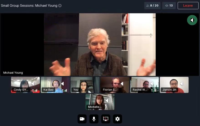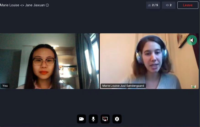|
||
|
||
|
| |||
| 03 JAN 2022 | ISSUE 16 | ||
|
| |||
| 6. Global Young Scientists Summit 2021 | |||||
|
WANGWU, Jiaxuan I was honoured to attend the Global Young Scientists Summit (GYSS) 2021, which was held virtually this year. The summit featured 18 plenary lectures, 5 panel sessions, small group informal sessions, an online exhibition area, a video contest and networking sessions. These activities covered several fields including biology, chemistry, physics, medicine, mathematics and computer science. Twenty-one distinguished scientists, including recipients of the Nobel Prize, Fields Medal, Millennium Technology Prize and Turing Award, gave inspiring lectures and led informative discussions.
The world is currently plagued by the COVID-19 pandemic, and the summit started with a plenary lecture by Prof. Robert Langer on solving global health challenges using biotechnology. During the speech, he described the mechanism behind the COVID-19 vaccine. He also mentioned the possibility of making organs and tissues on a chip, paving the way to minimise animal and human testing. I was impressed by another plenary lecture given by Prof. Aaron Ciechanover. He discussed six biomedical ethics issues that arose during the COVID-19 pandemic: treatment priorities, neglected subjects, vaccination, infodemic (misinformation and disinformation), inequality and discrimination. He mentioned that COVID-19 had been focused on at the expense of other necessary priorities. For example, children needed to go to school, domestic violence was prevalent, people were unemployed, and hunger was widespread. He also mentioned the scepticism and misinformation about vaccination. He pointed out that trust needed to be built between scientists and the media and that the government should deal transparently with the public. A panel discussion titled “Science and Policy” also mentioned the need to build trust between the government and community, stressing that the government should be open and honest about the data. Additionally, it was mentioned that more investments should be directed towards proactive pandemic preparation, science and technology. The panel speakers also suggested that young scientists could interact publicly, build networks and forge more international collaborations. These lectures and discussions were highly enlightening as they addressed prominent issues in today’s world.
I had an opportunity to participate in a small informal group discussion with a Nobel laureate, Prof. Michael Young, who discovered molecular mechanisms controlling the circadian rhythm. In his plenary lecture, he explained how this internal clock works in both Drosophila and humans. He also demonstrated the genetic control of sleep by a case study of human insomnia, focusing on the condition known as delayed sleep phase disorder. Cry1Δ11 gene expression is sufficient to lengthen the fibroblast rhythms of mice and humans. In the small group discussion, we further discussed how the environment affects sleep. Nowadays, many people drink coffee daily, use electronic devices before sleep and suffer from jet lag when travelling. Prof. Young described brain–body “conflicts” caused by the brain and body experiencing different phases due to a change of environment. However, the association between metabolic and psychiatric and sleep is still under investigation. Prof. Young’s speech illustrated to me how scientific research can contribute to our real lives. During the small group discussion, Prof. Young related his research journey, emphasising the importance of not quitting. Researchers will encounter many difficulties during their work, but they should explore alternative routes to achieving their goals because one route will eventually work out. Prof. Langer also encouraged us to dream big and never be afraid of the bumpy ride. Dr Venki Ramakrishnan encouraged us to be flexible, even if it meant being exposed to completely new techniques or fields. He mentioned that we should never be afraid to ask for help or acknowledge our ignorance. He offered the four G’s – geld (money), geschick (skill), geduld (patience) and gluck (luck) – as general lessons for our research journey.
In addition to the lessons, I made some new friends through a video contest in which we presented our research in a three-minute video. I enjoyed the presentations and was exposed to many cross-disciplinary research topics. Among all the videos, two stood out for me. First, Kriza Faye Calumba, who majored in food science in the Philippines, worked on making healthy beers with probiotics. Exploiting common fruits in the Philippines, she used probiotics protected by fibre in durian rind powder to help prevent gastro-intestinal disease and improve tolerance to lactose. In a direct conversation with her, she told me how she got the research idea: she loved and ate durian a lot, so she wondered how she could make beer healthier by adding durian into it, and persevered until she finally succeeded. She also mentioned that science is not abstract but around us. Second, I chatted with Marie Louise Juul Sondergaard, who explored the design of technologies that improve women’s health while ensuring that the technologies support gender equality and social justice. Her designs improve the female user experience through personalised products. For example, she developed a platform that shares menstrual data online, and a voice system to combat sexual harassment. She told me that nobody had done her kind of work in the past, so she was exploring ways to help women by using her scientific talents as a designer. I was touched by her work because it addressed many problems that women encounter in their daily life, and I hoped to be a beneficiary of these designs.
Almost all of the distinguished speakers highlighted the importance of curiosity and passion for one’s research. Among all of the enlightening suggestions, Prof. Thomas Cech’s was most striking: “You need to find your own way to use your scientific talents and passion”. I appreciate the precious opportunity to participate in GYSS 2021, and I would like to express my gratitude to the Department for the nomination and support.
|
|
||||
|
|
|||||
|
Past Issue
| |
|
|
|
|
|
Copyright ©
2025. All Rights Reserved. The Chinese University of Hong Kong.


